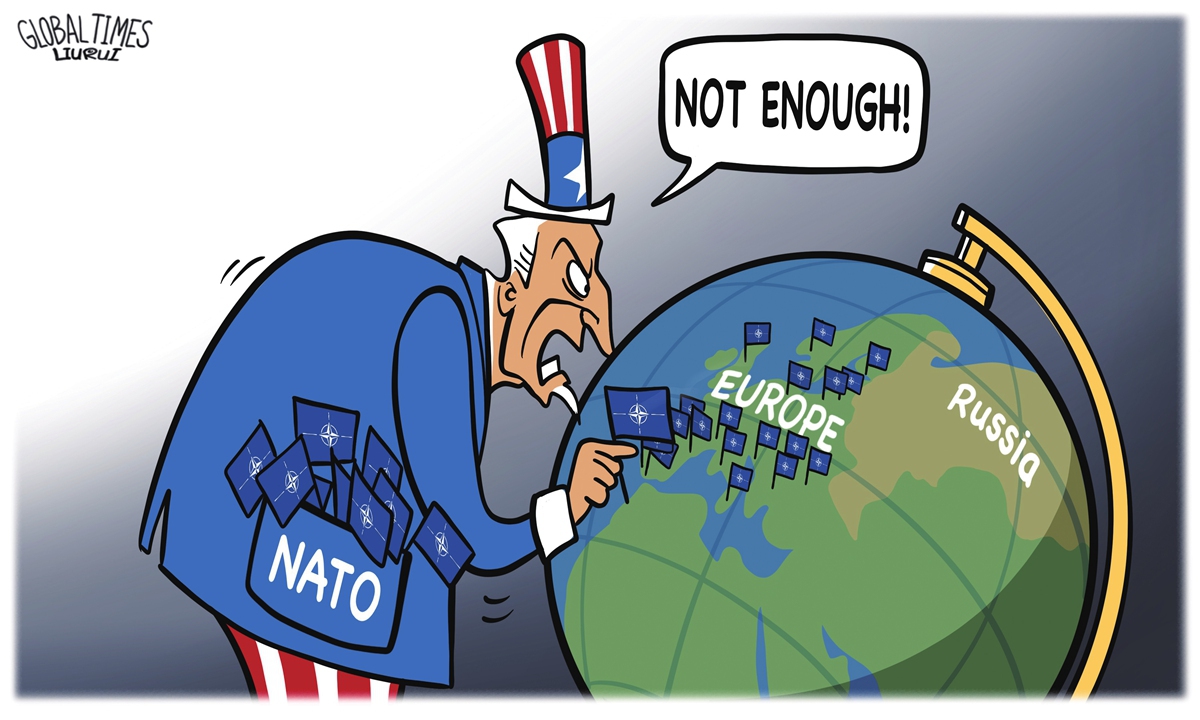
Nato expansion. Illustration: Liu Rui/Global Times
The Russia-Ukraine conflict drags on. There is no end in sight to a conflict that is now 16 months old, and there is no guarantee as to how it will end. But one issue has become clearer since the war began - the US will continue to use its military might as a means of maintaining hegemony. And this includes expanding NATO beyond Europe. In short, the US continues to weaponize NATO and the West, and with tragic results.
The fundamental issue now is the toll the war is taking on the Ukrainian and Russian populations. Buildings can be rebuilt. Families that have lost a loved one will forever be incomplete. Regardless of the cause of the conflict, we must acknowledge Russia's belief that had NATO, which receives 16 percent of its budget from the US, not crept ever closer to the Russian border from roughly 2000 through 2020, the war might never have happened. Remember former US secretary of State James Baker's "not one inch eastward" remark to former Soviet leader Mikhail Gorbachev in 1990? NATO would maintain a presence in Germany but not seek expansion east. That concept is now being spun as "an informal" promise, one that Russia failed to convert into an ironclad agreement. Then again, the US never committed to such guarantees either.
Throughout the US, the Russia-as-aggressor theme is now gospel, and to question it is to be quickly judged as a heretic. Yet in other parts of the world, the US' determination to expand NATO's presence throughout Europe and beyond is being talked about, and the organization is not viewed as the force its proponents argue it is. At the same time, questions are being asked as to whether NATO would consider expanding its mandate beyond Europe. Would it, for example, seek to have a place in East Asia?
The short answer: Yes. In mid-May, CNN reported that the Japanese government had held talks with NATO officials about opening a "NATO liaison" office in Japan. A Japanese official said that because of Russia's "aggression" in Ukraine, the world had "become more unstable." As a result, NATO as a kind-of white knight would ride in and keep the region safe.
A contributing fellow at the Defense Priorities think tank in Washington made a point, asserting that "NATO has no business in the Indo-Pacific region. The alliance should instead stick to its North Atlantic mandate and avoid stoking powder kegs on the other side of the world." Responsible Statecraft offered a similar argument, noting that NATO countries that favor "a less confrontational approach" with China are sure to feel slighted as NATO eyes Asia as a potential sphere of influence.
That the US is behind this NATO-in-Asia idea is indisputable.
NATO has demonstrated that it will show up in places other than Europe. It was involved in fighting the war in Afghanistan, and one former NATO official insisted the organization "began pursuing increasingly unrealistic goals" as it took control of the war effort that was already hampered by poor intelligence and a misguided sense of purpose. US citizens are well aware that trillions of American dollars were spent and thousands of lives were lost because of those errors in judgment.
NATO's forces bombed Libya more than a decade ago; a Foreign Policy editorial argued that NATO's continued refusal to acknowledge the toll its bombs took on the Libyan population is a scar on its integrity. Likewise, no US leader seeks to hold anyone accountable for the deaths of innocent people in Libya. To do so would require the US to also admit to its record of killing civilians in Afghanistan.
Then there is the rest of Africa. Despite the horrible results in Libya, NATO snaked its way through North Africa and into the body of the continent. One critic stated that "a general sensibility [is] growing in the continent against Western military aggression." This attitude explains why many African nations continue to refuse to support calls to condemn Russia's actions in Ukraine.
Perhaps the most important question Western nations, which have poured billions of dollars into providing Ukraine with sophisticated weaponry in order to fight the Russians, will have to answer in the coming months is this: What will their image be in South Asia, Africa and other places across the globe where their message of democracy and peace is viewed with skepticism? At the same time, how will NATO be received with evidence that it is responsible for bloodshed in places far away from Europe? Lastly, what should American officials think when they realize that billions of people around the world see the US not as a bastion of peace but as a monster looking for war?
The author is an associate professor at the Department of Communication and Organizational Leadership at Robert Morris University. opinion@globaltimes.com.cn




